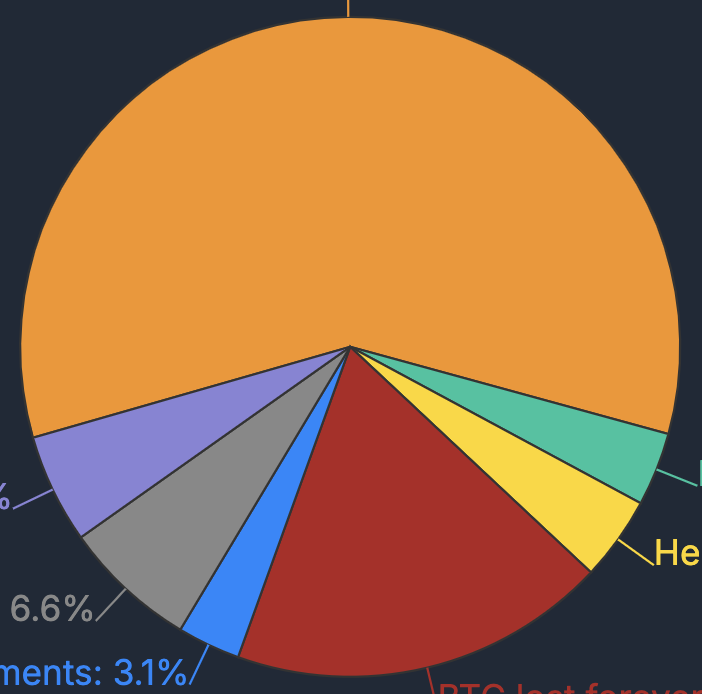The Great Bitcoin Centralization Debate: MicroStrategy Now Owns 2% of All Bitcoin

There's a fascinating paradox unfolding in the Bitcoin world that's forcing us to grapple with some fundamental questions about decentralization. MicroStrategy just picked up another $2.1 billion worth of Bitcoin, bringing their total holdings to around $42 billion - approximately 2% of all Bitcoin in existence. This aggressive accumulation strategy has sparked an important debate about centralization in a system that was explicitly designed to be decentralized.
The Bitcoin Paradox
Here's the fascinating tension at play: Bitcoin was created as a peer-to-peer electronic cash system meant to enable democratic ownership and accessibility to anyone with an internet connection. The core principle is that you should be able to buy as much as you want - that's part of a free market system. But at the same time, having any single entity own a significant portion seems to go against Bitcoin's fundamental ethos of decentralization.
The numbers here are significant. Currently, MicroStrategy has about $42 billion in Bitcoin backed by roughly $8-10 billion in debt. Some critics worry this creates too much concentration of ownership and risk. However, the math suggests even a 75% drop in Bitcoin's price would still leave enough value to cover their debt obligations. Plus, knowing CEO Michael Saylor's strategy, the company would likely keep buying on the way down.
The Financial Engineering Behind It
What's particularly interesting is how MicroStrategy is funding these purchases. They're using a combination of equity sales and debt instruments, including convertible notes. This financial engineering has drawn increased scrutiny, but it's also showcasing how traditional financial instruments can be used to accumulate Bitcoin at scale.
The company trades at nearly double the value of their Bitcoin holdings plus their software business, suggesting the market is pricing in their ability to continue acquiring more Bitcoin. While some see this as speculation, others view it as appropriate given their proven ability to keep accumulating and their first-mover advantage in corporate Bitcoin adoption.
The Shareholder Question
An interesting counterpoint to the centralization concern is that MicroStrategy is publicly traded - meaning their Bitcoin is actually owned indirectly by thousands of shareholders, including major institutional investors like BlackRock and Fidelity. This creates a form of distributed ownership, similar to how Bitcoin ETF holdings are ultimately owned by many individual investors.
This raises an important question: Is corporate ownership of Bitcoin actually a form of centralization if the company itself has distributed ownership? It's not as straightforward as it might initially appear.
The Network Effect
It's crucial to understand that Bitcoin's design ensures that even massive holders can't control the network itself - owning more Bitcoin doesn't give you special powers or voting rights. The network remains permissionless and accessible to all, operating on the same rules regardless of how much Bitcoin you hold. This is fundamentally different from traditional corporate structures where large shareholders can influence governance.
Risk Considerations
There are legitimate concerns about concentration risk, particularly around market impact if large holders decide to sell. However, MicroStrategy has been transparent about their long-term holding strategy and has structured their finances to avoid forced selling scenarios. They've essentially created a Bitcoin holding company that gives traditional investors exposure to Bitcoin through familiar securities.
The Institutional Angle
MicroStrategy's accumulation strategy is also serving as a proof of concept for other corporations considering Bitcoin treasury reserves. They're creating a playbook for corporate Bitcoin adoption, including how to handle accounting, security, and financial structuring. This institutional adoption pathway could actually lead to more distributed ownership over time, not less.
The Path Forward
Rather than debating whether this level of ownership is "too much," the productive response is to participate in the market yourself. If you're concerned about centralization, you can go buy more Bitcoin. The system incentivizes competition rather than complaints, which is exactly how it was designed to work.
As for MicroStrategy, they're playing by the rules of a free market while adding institutional legitimacy to Bitcoin. Whether their strategy proves brilliant or foolish, they're stress-testing important questions about ownership concentration in a decentralized system and forcing us to think deeper about what decentralization really means.
Looking Ahead
The MicroStrategy situation is likely a preview of challenges we'll continue to face as Bitcoin matures. As more corporations and institutions enter the space, we'll need to reconcile the tension between free market accumulation and decentralization principles. The good news is that Bitcoin's protocol-level decentralization remains intact regardless of ownership distribution.
What do you think about large entities accumulating significant portions of Bitcoin's supply? Is corporate ownership a threat to decentralization, or is it a natural evolution of the Bitcoin ecosystem? Let us know in the comments below!




































